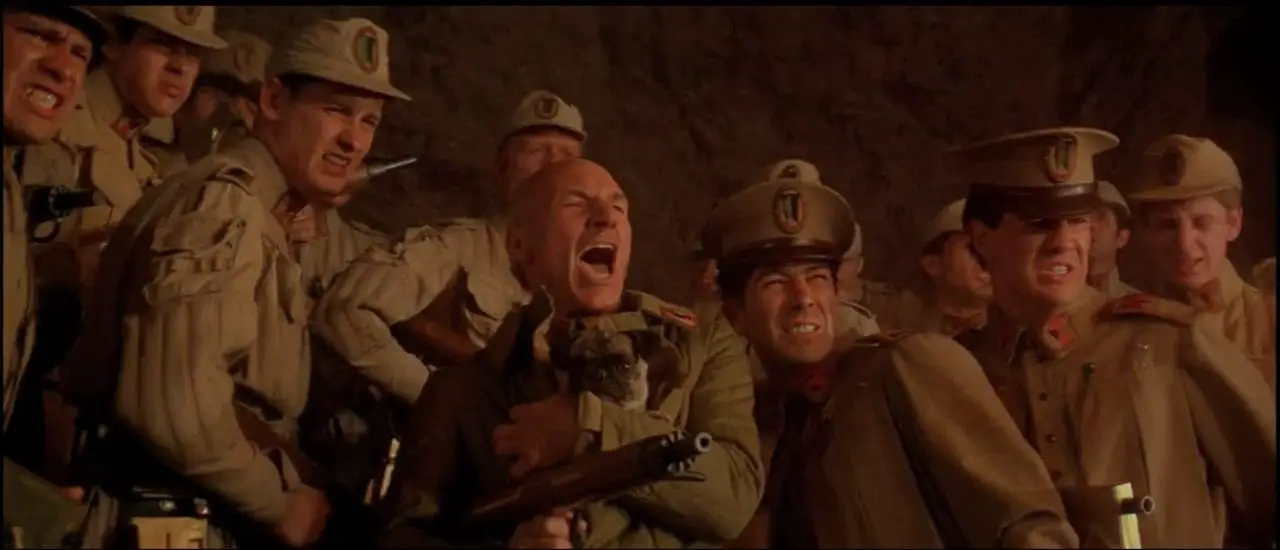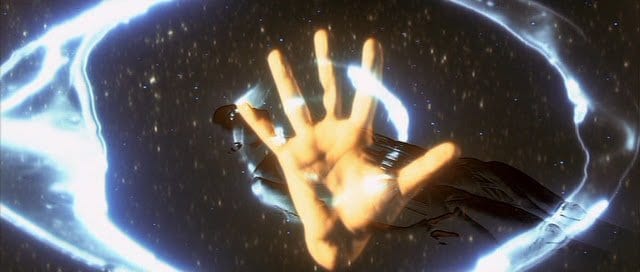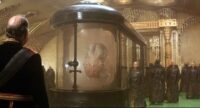“This movie is a real mess, an incomprehensible, ugly, unstructured, pointless excursion into the murkier realms of one of the most confusing screenplays of all time.”
– Roger Ebert [1]
Mr Ebert’s opinion was not a lone voice at the time of Dune’s release onto an unsuspecting public in 1984. The consensus was that this was definitely no Star Wars. It was in fact, largely dismissed as a confusing failure, although some reviewers drew attention to the remarkable visual qualities of the film, even if some of them seemed a little, well, cheap.
Ebert’s friend had recommended it to him stating: “It’s like a dream[…]It doesn’t make any sense, and the special effects are straight from the dime store but if you give up trying to understand it, and just sit back and let it wash around in your mind, it’s not bad.”
This doesn’t sound like terrible advice for watching any Lynch film. Often trying to pin a rational explanation on Lynch-directed projects tends to spoil the flow and, more often than not, there is no rational single ‘explanation’. Lynch likes to paint with images, splicing them together to create a moving canvas of dreamlike snapshots. He has also always had a penchant for hands-on DIY solutions to special effects. He approaches special effects in the same way he approaches his art. This tends to work fine on his smaller productions, but on a special effects-driven science fiction epic these things tend to be more jarring given the expectations of the audience—even in 1984. It was also something he ran into trouble with on his earlier film The Elephant Man, when his efforts to create the makeup for the character of John Merrick failed and makeup artist Chris Tucker had to be brought in. The areas where the effects of Dune do shine—at least for the period—are largely those of the sets, set-dressing and models. It’s possible large chunks of the sizeable $40 million budget were in fact blown on these lavish creations, leaving little for the computer effects which were somewhat less convincing. Costumes and character makeup were likewise confusingly patchy, ranging from the lush detailed Victorian imperial costumes of the Atreides, via the padded cyberpunk garb of the Spacing Guild, right through to the awful hazmat suit chic of the Harkonnens.

The checkered production history of Dune is relatively well-known. The movie rights were originally in the hands of Arthur P. Jacobs (producer of the Planet of the Apes movies) but he died, and the project sank. In 1973, a French consortium bought the option with Alejandro Jodorowsky to direct. The saga of Jodorowsky’s ill-fated production is covered in the documentary Jodorowsky’s Dune, but suffice to say that after spending two million on pre-production and a script the size of a telephone book, nobody wanted to fund it. Dino De Laurentiis bought the rights in 1978 and hired Ridley Scott to direct. Pre-production was slow, and Scott apparently wanted to split the book into two movies. It’s not clear what happened, but it seems that Scott thought the project would take too much time and moved on to create Blade Runner instead, leaving Dune back in De Laurentiis’ lap. At this point, Lynch had just achieved huge critical and commercial success with The Elephant Man and was courted by George Lucas to direct Return of the Jedi, as well as by Dino to take over control of Dune.
Pause a moment to imagine a Return of the Jedi directed by David Lynch. I doubt very much that he would have allowed fluffy squeaky bears to play such a prominent role. Possibly existential and disturbing human-sized rabbits, but no Ewoks. It’s not even clear what it was in Lynch’s two feature films to date that made Lucas and De Laurentiis think he would make a good director for a sci-fi epic, particularly a box office-conscious family-friendly one like Star Wars. It’s likely that Lucas—like the De Laurentiises—had never seen Eraserhead, and thought the dark dreamlike visuals of The Elephant Man were simply Lynch doing what was appropriate for the story, and that he would adapt his stunning visual direction for their science fiction worlds. De Laurentiis was far closer to the mark picking his man, assuming he had seen something of the treatment that Jodorowsky’s art team had previously given the source material. There are passing similarities between the finished Dune aesthetic of Lynch and Giger’s designs, but clearly, nothing in Lynch’s earlier work indicates that this is a man you want directing a film intended to please a popcorn-munching crowd of moviegoers expecting space battles, lightsabers and quippy robots.
In the interests of full disclosure, I should come clean and admit to being something of a long-time Frank Herbert’s Dune fanboy. I am of course also a Lynch-lover, but have never been the type of fan that will blindly love everything without criticism. I’m aware of the problems and criticisms of the Dune books, particularly the later novels (which incidentally I love). I first read Dune at the tender age of about 10. It wasn’t an easy read, and I must admit I skimmed a bit in that first read, particularly at what seemed interminable passages of planetologist Liet-Kynes wandering around in the desert waffling at length about ecology. I would expect a fair amount of the cultural, political and religious depth passed me by also, but Dune is one of those books that rewards further reading, giving up its secrets slowly. The depth and scope of the ideas in Dune are what make it loved by so many. Against this backdrop of a complex alien universe of ideas, the story of the political struggle of the Great Houses and the rise of the Fremen jihad led by Paul Muad’Dib is played out.
Essentially, Dune is not a book that you can cram into one movie and is why it was initially considered unfilmable. Some still maintain that position. It is a big book full of big ideas and lots of characters. If you strip out everything but the main beats of the story’s essence you can possibly squeeze it into two hours, but everything that once made it a good story is now gone. Lynch made an effort to retain the grandeur, the scope of the universe, and the mysticism of the book, but the pieces ended up being not terribly coherent—not in a good, dreamlike Lynchian way, but in a bad “let’s edit this mess quickly and get it out the doorway”. The pacing also was patchy, to say the least. The film includes long sequences of stately spaceships gliding serenely through space, followed by fairly clunky special effects of the glowing space-foetus that is the Guild Navigator (possibly imagery he revisits and perfects in Part 8 of The Return), and over-hurried battle montages. Add to that the constant voiceover exposition and the “helpful” introductory monologue from Princess Irulan that bombards the audience from the off with confusing lingo—rather than letting the world unfold as it goes—and it’s clear that you don’t have enough space to tell the story you need to tell or even a firm grasp on the parts of the story you want to tell.
Devotees of Herbert’s Dune had plenty to be upset by in Lynch’s treatment of the novel. The Bene Gesserit are reduced to badgering old hissing bald women, rather than the powerful order who are a major player in the Universe. As with the Harkonnens, there is no subtlety in the writing of these characters and they become pale shadows of what they were in the novel. Also removed wholesale was the “Weirding Way”; the fighting technique of the Bene Gesserit that Paul and Jessica teach to the Fremen. It is these techniques, coupled with their huge numbers, that help the Fremen to victory on Arrakis. Lynch replaced this with the “Weirding Modules”: voice-activated blasters. Why this is more efficient than using a trigger is uncertain. Apparently, Lynch didn’t think the hand-to-hand combat would work well in the film, and wanted to avoid “Kung Fu in the desert”, but also lost was more detail of the mythology of the Bene Gesserit sisterhood and their involvement in the success of the jihad. The detail of Paul’s time with the Fremen is also gone, and we lose that sense of the deep connection he builds with them, possibly becoming more Fremen than Atreides. Worst of all was the ending; where Paul makes it rain, indicating that he has godlike powers that he shouldn’t have, and ignoring the fact that the rain would kill all the sandworms. If you were willing to forgive everything else, the ending alone would elicit a sigh of dismay.
Time constraints clearly play a huge role in the problems of making Dune into a movie, but some of the choices Lynch makes in what to include and what to leave out are a little bizarre. In one sense, his focus seems to be on Paul, and the slippy nature of consciousness, a favourite Lynch trope. He lingers on the thoughts and dreams of Paul, the visions when he takes the spice essence, the symbols and the dreamer who must awaken to fulfil his destiny; ideas that he plays with more—and with more complexity— in Twin Peaks Season 3. However, instead of zeroing in on the journey of Paul from a young man to messiah and emperor, and the mental transformation that takes part in the process, Lynch also tries to throw in much of the entire scope of the novel. He does excise most of the ecological focus of the novel (which some would argue misses the point entirely) but includes whole minor plot points that could probably be cut without losing the core narrative.

The Final Cut
So, did Lynch bite off more than he could chew with this movie? Is it just a matter of him not having the ability to write and direct a coherent story from existing source material? It’s clear from The Elephant Man that this isn’t the case. It has elements of Lynch’s trademark surrealist dream imagery and the attention on visual aesthetics and mood, but the story is coherent, flows well, whilst hitting all the emotional buttons it needs to. It might not be the Lynch that many of his fans want, but it proves that he can do it. To a lesser extent, The Straight Story shows his skill in telling a story when he wants to. I say to a lesser extent simply because he didn’t write the script, so had less of a chance to Lynch it up.
One of the main complaints about Lynch’s Dune—and definitely something that undermines its quality—is the over-reliance on voiceover for exposition. Herbert uses the thoughts of characters to great effect in the books, but this is something that works well in literature and is well-known to be avoided at all costs in cinema. Possibly this technique would have worked if contained to the character of Paul, not for exposition, but to let us into the inner world of the central character. The central tenet of filmmaking is “show don’t tell” and this film reverses that. In trying to explain the universe by “telling” it makes it more confusing.
Regarding all the exposition, Lynch states in Chris Rodley’s Lynch on Lynch that “[…]a lot of it was meant to be in the film but, like, 40% of it was added on to nail things that they thought people would not understand.” There was clearly conflict over the type of movie that the producers wanted and the one that Lynch was delivering, and this led to post-production issues. It’s uncertain why any concerns or issues weren’t raised at the script stage rather than after shooting had completed. Lynch himself all but admits that the main reason he took on the project in the first place was to have the freedom—both financially and artistically—to explore his ideas in this universe.
“I started selling out on Dune. Looking back, it’s no one’s fault but my own. I probably shouldn’t have done that picture, but I saw tons and tons of possibilities for things I loved, and this was the structure to do them in. There was so much room to create a world.” [2]
Regardless of what is in the script, Lynch has always been the kind of director who likes to shoot the scenes, shoot extra scenes that he thinks of on the spot, and then arranges the final product in the editing room. On Dune, he didn’t have the final cut, and he didn’t get to complete his process. His planned final cut was nearly three hours long, but the studio and backers wanted a more traditional two-hour cut. Maybe the studio panicked after seeing the early four-hour rough cut, realised they risked losing $40 million and decided to take over in order to try and salvage a film more to their liking.
“That’s the big lesson. Don’t make a film if it can’t be the film you want to make. It’s a sick joke, and it’ll kill you.” [3]
It’s not certain that a fully Lynch-edited version of Dune would have made any more money, but there is a good chance it would have been less garbled and tried to force-feed the plot details less. The De Laurentiises forced Lynch’s hand, and drastic cuts were made removing scenes, adding new scenes to condense and simplify things, added the voiceover narrations, and the introduction by Virginia Madsen. Editor Antony Gibbs says in the 2003 documentary Impressions Of Dune: “David wanted a 3 hour movie and Dino wanted a 2 hour movie and Dino won…it broke David’s heart to have to cut it down to that length.”
Arrakis teaches the attitude of the knife – chopping off what’s incomplete and saying: ‘Now, it’s complete because it’s ended here.’
– from “Collected Sayings of Maud’Dib” by the Princess Irulan”
― Frank Herbert, Dune
Lynch seems to consider Dune his biggest failure, and rarely talked about it afterwards. It was also the last time he gave up the rights to the final cut on a movie, and the last time he worked on a film with anything close to that kind of budget. Disastrous it may have been in his opinion, but he seemed to learn from the experience the kind of filmmaker he wanted to be, and what to avoid. Regardless of the critics, and Lynch’s own opinion, the movie is still much loved by many—myself included—albeit possibly more for the whimsical, weird and eminently quotable nature of it than because it is a great movie.
“It wouldn’t be fair to say to say it was a total nightmare. But, maybe 75% nightmare. And the reason is that I didn’t have final cut[…]if you don’t have final cut you stand to die the death[…]and die I did.”
[1] https://www.rogerebert.com/reviews/dune-1984
[2] David Breskin, Inner Views: Filmmakers in Conversation.
[3] https://youtu.be/6lZKcW9OGoU?t=3m30s





they butchered the book , the story the essence , sorta like they did with eragon . but somehow even worse??? movie is a pale shadow of the book unfortunately
Everything huh? Literally everything I said is wrong? Hard to argue with such a balanced and reasoned retort.
The power of the BG is in no way represented in the movie.
The end basically ruins any opportunity to follow the story of the later books.
And, I think I laid out the difficulties of filming the book in one film clearly, so it seems you didn’t really read the article properly, just leapt right to outrage.
You are so wrong about everything.What you saw unfold before your eyes was a great imagining of the book .Yes its not perfect, but it still is great..the sisterhood weren’t crackling bald old women they were clearly POWERFUL but discreet.An order not interested in the singular human, but the whole span of human existence leading to the Kwisatz who they wanted to mold and control hardly toothless.
Paul’s character was played like a young man with great maturity and a budding awakening of his genes, heavily supported like most crowned princes with teachers,warriors and the weight of his future role and unfortunate legacy rivalries.
As for the end Dune has a few books after it i.e there is more to the story.David lynch or anyone would find it hard to distill the story into a 2 hr movie..but i think it was somewhat faithful to the books.Even after the book was retold in a 3 part trilogy even that wasn’t enough time.